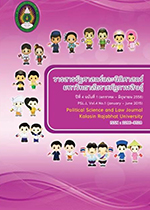การประเมินเครื่องมือธรรมาภิบาล : การมีส่วนร่วมและการเสริมแรงพลังชุมชน
DOI:
https://doi.org/10.14456/gjl.2015.6คำสำคัญ:
การมีส่วนร่วม, การเสริมพลัง, เครื่องมือธรรมาภิบาล, Participation, Empowerment, Governance Measureบทคัดย่อ
การวิจัยประเมินเครื่องมือธรรมาภิบาลนี้เป็นส่วนหนึ่งของโครงการสะพานเสริมสร้างประชาธิปไตย (Sapan) ซึ่งได้รับทุนสนับสนุนจากองค์การเพื่อการพัฒนาระหว่างประเทศ (USAID) รัฐบาลประเทศสหรัฐอเมริกา เพื่อประเมินผลการนำเครื่องมือธรรมาภิบาลบัตรศักยภาพชุมชน (Community Scorecard) และข้อตกลงพลเมือง (Citizen Charter) ไปใช้ในคณะทำงานเครื่องมือธรรมาภิบาลในสามพื้นที่คือ คณะทำงานบ้านทัพไทย คณะทำงานบ้านหนองจาน และคณะทำงานบ้านหนองแกซึ่งทั้งสามพื้นที่อยู่ในพื้นที่ อำเภอเมือง จังหวัดอุบลราชธานี เพื่อนำแนวทางการศึกษาไปใช้ประกอบการตัดสินใจดำเนินการและปรับเปลี่ยนการดำเนินงานของโครงการต่อไป แนวคิดทฤษฎีที่นำมาใช้ประกอบการศึกษาครั้งนี้ได้แก่ การมีส่วนร่วม (Participation) และการเสริมพลัง (Empowerment)ผลการศึกษาพบว่า บัตรคะแนนศักยภาพชุมชนและสัญญาใจพลเมือง ถือได้ว่าเป็นเครื่องมือที่สำคัญในกระบวนการเสริมศักยภาพและสร้างการเรียนรู้กระบวนการประชาธิปไตยให้กับคณะทำงานเครื่องมือธรรมภิบาล เห็นได้จากการมีส่วนร่วมของคณะทำงานในภาพรวมนั้นมีการเปลี่ยนแปลงในด้านบวกอย่างชัดเจนหากพิจารณาตามแนวคิดของ Pretty (1995) จากเดิมที่คณะทำงานส่วนใหญ่มีระดับการมีส่วนร่วมในแบบ ‘การมีส่วนร่วมที่ไม่จริง’ และ ‘การมีส่วนร่วมแบบเฉื่อยชา’ ปรับเปลี่ยนไปสู่การมีส่วนร่วม ‘แบบปรึกษาหารือ’ อย่างไรก็ตาม มีชาวบ้านบางคนที่มีความกระตือรือร้นในการทำงานกับโครงการ และได้แสดงความต้องการที่จะมีส่วนร่วมมากกว่าชาวบ้านกลุ่มอื่น ทำให้ชาวบ้านกลุ่มนี้เห็นความสำคัญของการมีส่วนร่วมมากขึ้นอย่างก้าวกระโดดไปสู่ ‘การมีส่วนร่วมที่มีปฏิสัมพันธ์’ แม้การเปลี่ยนแปลงเชิงทัศนคติจะไม่ได้เกิดกับคณะทำงานในระดับที่เท่ากันทุกคน แต่ก็สามารถแบ่งการเปลี่ยนแปลงในเชิงทัศนคติต่อการมีส่วนร่วมได้เป็น 2 ประเด็นหลักคือ 1) การเห็นความสำคัญของการมีส่วนร่วม และ 2) ด้านการตื่นตัวเรื่องที่ดินสาธารณะอย่างไรก็ตาม การเห็นความสำคัญของการมีส่วนร่วม และการตื่นตัวเรื่องที่ดินสาธารณะ ดังกล่าวข้างต้น ก็ยังมีข้อจำกัดที่ยังไม่สามารถเปลี่ยนไปสู่การปฏิบัติได้สมบูรณ์ โดยมีข้อจำกัดที่สำคัญหลายประการได้แก่ ข้อจำกัดด้านเวลาของโครงการข้อจำกัดด้านศักยภาพของคณะทำงานบางส่วน อีกทั้งข้อจำกัดของระบบราชการและตัวบทกฎหมายในการเปิดโอกาสให้ประชาชนเข้าไปมีส่วนร่วมในการบริหารจัดการที่ดินสาธารณะอย่างแท้จริง
This research was the project under Sapan project funded by USIAD which aims to evaluate governance measures i.e. community scorecard and citizen charter applied to working groups at Baan Thabthai, Baan Nongchan, and Baan Nong Khae that are in Maung district, Ubonratchathani. This study would assist to make decision on operating or adjusting the project afterward. Qualitative data analysis relied on interview and the theory of participation and empowerment.
The finding revealed that community scorecard and citizen charter was important tool to empowerment and democratization to the working groups. In terms of participation, there was significant change among them according to Pretty’s participation model (1995). Initially their participation feature was ‘manipulative participation’ and ‘passive participation’; however, after attended the project their views on participation shifted to ‘participation by consultation’. Some working groups were more very active than the other and their view on participation advanced to ‘interactive participation’. Even if not all villagers shared the same level of change, changing attitude to participation of the working groups could be identified into 2 points : 1) awareness of the importance of participation and 2) awareness of public land. Even if the changing mentioned above emerged, the change was mostly limited to the view of the participants, but not the behavior due to many restrictions namely the time restriction of the project, potential limitation of some working groups; and bureaucratic limitations. Three working groups still required this kind of helpful project to to empower community people. After the project terminated, the working groups said they could apply governance measure to assess the public service in the future and they also suggested the role of the project could be adjusted to consultant on the operating process.
Downloads
ดาวน์โหลด
เผยแพร่แล้ว
รูปแบบการอ้างอิง
ฉบับ
ประเภทบทความ
สัญญาอนุญาต
ลิขสิทธิ์ (c) 2017 วารสารการบริหารปกครอง (Governance Journal)

อนุญาตภายใต้เงื่อนไข Creative Commons Attribution-NonCommercial-NoDerivatives 4.0 International License.








